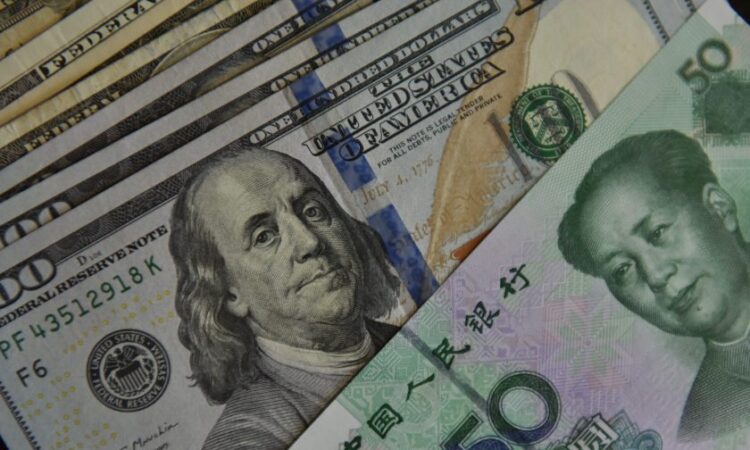

The question on whether the U.S. dollar will stay the world’s reserve currency is more current than it’s been in years. Costfoto—NurPhoto via Getty Images
Good morning, Peter Vanham here in Geneva.
What will be the world’s future reserve currency?
That question is more relevant than it has been in years due to inflation and high interest rates in the U.S. and Europe, the crash of digital currencies, and the depreciation of emerging market currencies from the renminbi to the rupee. But depending on whether you’re in Jackson Hole or Johannesburg this week (or on one of our podcasts), the answer might be very different.
Over in the Rocky Mountains, the yearly Jackson Hole symposium mostly welcomes those rooting for the greenback: Western central bankers. At the heart of their discussions lies the question of whether “higher-for-longer” interest rates are the right strategy to protect their currencies, or whether it’s time to pause, or even reverse course, given the risk of a recession. The likelihood of the dollar staying the world’s reserve currency will depend on getting that balance right.
On the other hand, participants at the annual BRICS summit in Johannesburg have a different outlook. The BRICS summit gathers the leaders of the world’s leading “emerging markets,” including South Africa, China, India, Brazil, and Russia (although Russian President Vladimir Putin is not attending). And the leader of the bloc’s international development bank, Dilma Roussef, left no doubt about their intentions: They want to reduce their reliance on the dollar–and introduce BRICS currencies for international payments and loans.
Amid this geoeconomic bickering, Jeremy Allaire, the CEO of cryptocurrency firm Circle, sees a third way. “There’s been this dollar hegemony, but that’s very much under threat right now,” particularly from China, he said on our latest Leadership Next podcast, out this week. But according to Allaire, the future isn’t so much with the physical greenback or yuan. “The competition over money is becoming a technological competition,” he said.
Allaire believes the future lies in so-called stablecoins that track the value of existing currencies, in which his company specializes. He says the challenge for the U.S. is to “establish a federal regulatory regime for…digital dollars, that are provided by private companies.” The end game, he says, is that “everyone in the world, who uses one of these [stablecoins], understands what these are, that they can be treated like the equivalent of cash in the balance sheet.”
More news below.
Peter Vanham
peter.vanham@fortune.com
@petervanham
TOP NEWS
Cotopaxi’s CEO calls it quits
What drives a CEO of a buzzy, fast-growing startup to step down? Davis Smith, CEO of apparel company Cotopaxi, recently stepped down from his position to embark on a three-year assignment as an unpaid “mission president” for the Mormon church in Brazil. “I’m always going to be willing to serve,” Smith tells Fortune’s Michal Lev-Ram, and “would never say no if I was asked to give back.” Fortune
Riyadh Air
Saudi Arabia is investing $30 billion in a new airline to tap into a domestic market hungry for tourism. “Inward and outward demand for air travel has gone off like a fire hydrant,” CEO Tony Douglas tells Fortune’s Phil Wahba. The country, under de facto leader Crown Prince Mohammed bin Salman, is trying to diversify the economy away from oil, including investing in areas like professional sports, electric vehicles, and video gaming. Fortune
Not sporting
Shares in retailer Dick’s Sporting Goods collapsed by almost 24% Tuesday after the retailer slashed its full-year outlook. The company reported a 23% drop in profit, blaming “elevated inventory shrink,” a term that refers to goods lost through theft, fraud, or other reasons. The bad news dragged down shares of other sports retailers, with both Nike and Lululemon falling by just over 1%. CNN
AROUND THE WATERCOOLER
A product YouTube built 16 years ago could give the music industry a secret weapon to hunt down A.I. generated ripoff songs by Rachyl Jones
The experience-hungry American consumer is already crashing the economy into a ‘rolling recession,’ Oxford Economics says by Will Daniel
Commentary: Gen Z’s approach to work might not be that different after all by Margaret Franklin
Housing market affordability is worse now than at the height of the housing bubble in 2006 by Lance Lambert
Are Meta and X walking publishers to their deaths? by Alexandra Sternlicht
This edition of CEO Daily was curated by Nicholas Gordon.
